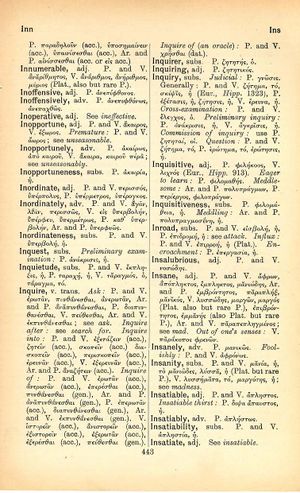inordinate: Difference between revisions
From LSJ
ἐπείγει γάρ με τοὐκ θεοῦ παρόν → the divine summons urges me | what has come from the god urges me | the power of the god is present, hurrying me on
m (Text replacement - "(|thumb)\n(\|link=)" to "$1$2") |
m (Woodhouse1 replacement) |
||
| Line 1: | Line 1: | ||
{{Woodhouse1 | {{Woodhouse1 | ||
|Text=[[File:woodhouse_443.jpg|thumb|link={{filepath:woodhouse_443.jpg}}]] | |Text=[[File:woodhouse_443.jpg|thumb|link={{filepath:woodhouse_443.jpg}}]] | ||
P. and V. [[περισσός]], [[ὑπέρπολυς]], P. [[ὑπέρμετρος]], [[ὑπέρογκος]]. | ===adjective=== | ||
[[prose|P.]] and [[verse|V.]] [[περισσός]], [[ὑπέρπολυς]], [[prose|P.]] [[ὑπέρμετρος]], [[ὑπέρογκος]]. | |||
}} | }} | ||
{{Lewis | {{Lewis | ||
Revision as of 09:18, 20 May 2020
English > Greek (Woodhouse)
adjective
P. and V. περισσός, ὑπέρπολυς, P. ὑπέρμετρος, ὑπέρογκος.
Latin > English (Lewis & Short)
ĭnordĭnātē: and ĭnordĭnātim,
I advv., v. inordinatus fin.
Latin > French (Gaffiot 2016)
ĭnōrdĭnātē, Cels. Med. 3, 3, et ĭnōrdĭnātim, Amm. 19, 7, 3, irrégulièrement, sans ordre.
Latin > German (Georges)
inōrdināte, Adv. (inordinatus) = ἀτάκτως (Gloss.), unordentlich, der Ordnung zuwider, agere, Cels. 4, 32 (25): redire, Cels. 3, 3: ambulare, Vulg. 2. Thess. 3, 6; außerdem Ps. Cypr. sing. cler. 2.

